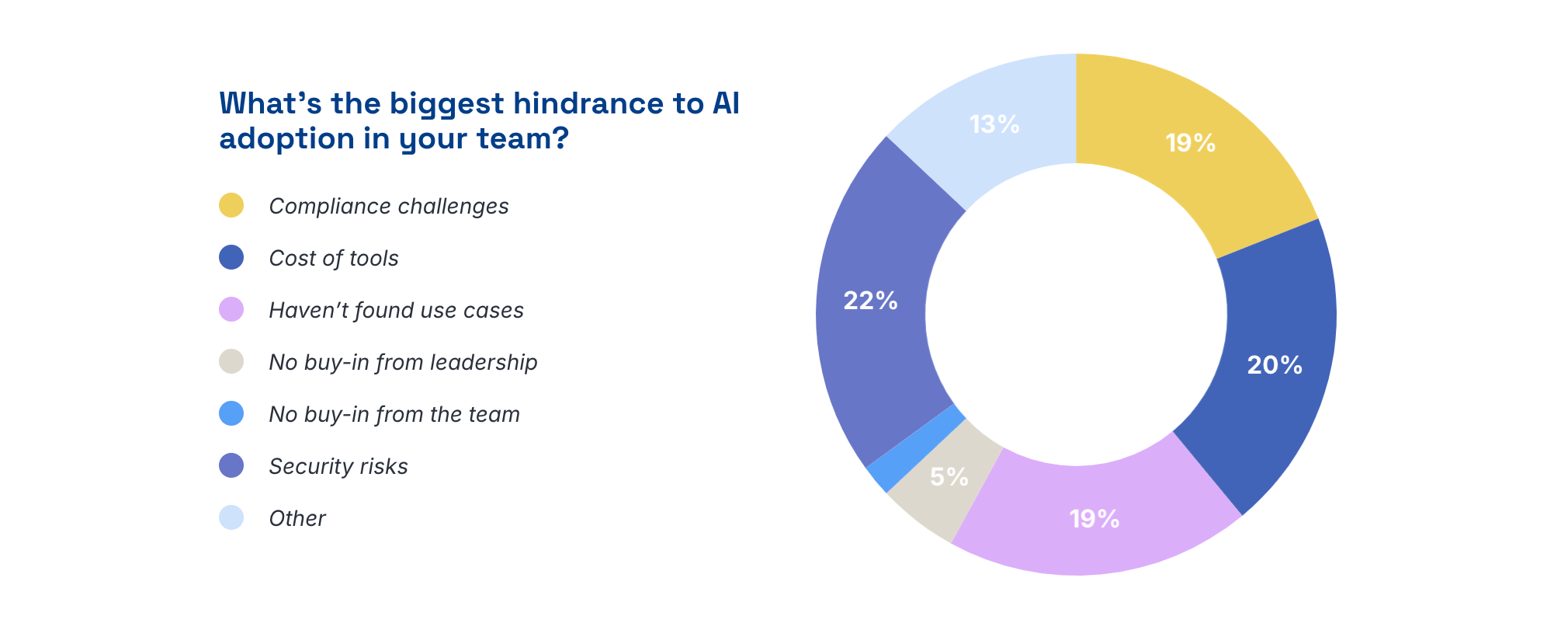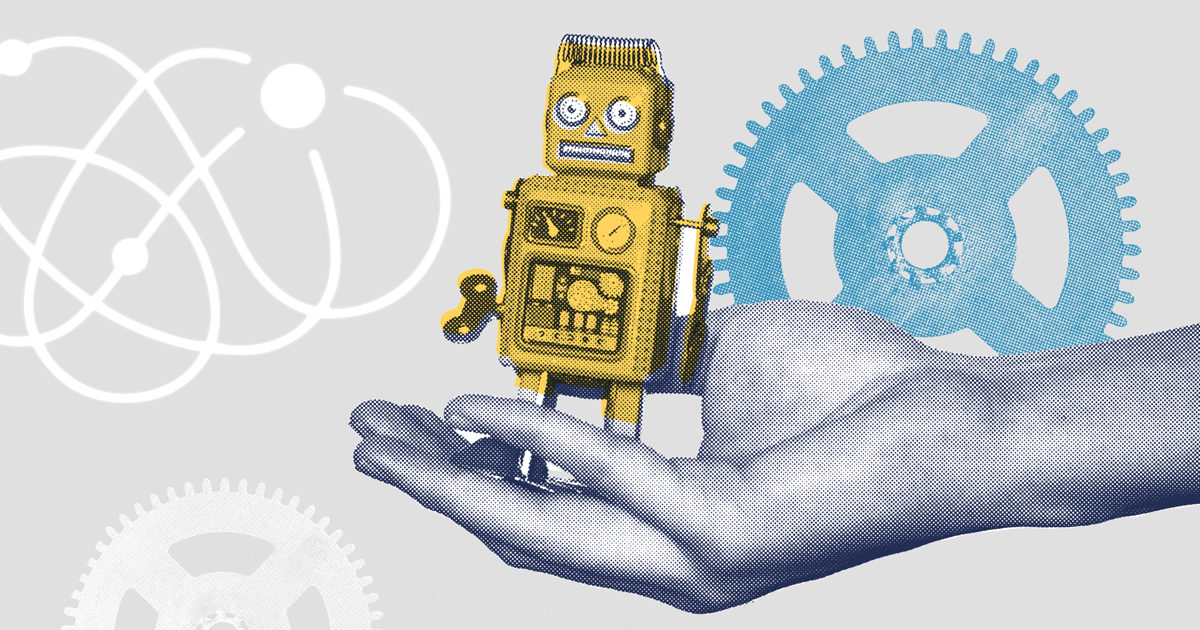It’s an understatement to say that the rise of artificial intelligence is a significant trend. The growing adoption of generative AI tools as virtual assistants has already brought about a fundamental shift in the way we all work, and agentic AI has even broader implications for the future. This evolution is a major priority for Salesforce, which has been a leader in applying generative and agentic AI technology in the CRM space.
In our latest State of Salesforce DevOps report, we asked professionals in the Salesforce ecosystem about their view of AI adoption: the current state of play across their businesses, the barriers to uptake, and the appetite for the opportunity presented by new AI models.
AI enthusiasm outweighs reluctance
New and disruptive technology always has the capacity to provoke a mixture of excitement and concern, and the arrival of generative AI has been no exception. But the data from our survey is clear: individuals and businesses alike are accelerating their AI adoption.
- 86% of respondents are exploring new use cases for AI in 2025
- 37% plan to optimize existing applications of AI
- Just 9% report pulling back on AI in some areas
The adoption of AI is grassroots
The sentiment towards AI among Salesforce professionals is broadly positive, and one of the most striking findings is the grassroots nature of AI adoption. Many Salesforce professionals feel that they’re ahead of their team in using AI — and that their team is ahead of the wider business.
- 61% of respondents personally use AI in their work
- 41% report team-wide adoption of AI
- 37% report AI-driven business initiatives
This suggests that developers, administrators, and team leads are often the early adopters of new technology, experimenting with generative AI tools and techniques in their routine tasks, which then gradually influences their team and business-level strategies. Some respondents even questioned whether their wider business would catch up at all — highlighting a growing gap between early experimentation and broader strategic commitment.
To harness this grassroots momentum, IT leaders should create a clear AI strategy, communicate it widely, and put the right guardrails in place to maintain security and compliance.
The rate of AI adoption varies considerably by industry. Among respondents working in tech firms, 34% report business-wide uptake. In contrast, no respondents working in government reported adoption at an organizational level. This difference reflects the differing regulatory environments, risk appetites, and strategic priorities across sectors.
Agentforce Maturity Model: From Readiness to Delivery
The hurdles to AI adoption
While individuals, teams and businesses are adopting AI at pace, there are still hurdles to overcome. Security, compliance, and cost are three major barriers. But just as often, the real barrier is that teams simply don’t have a clear use case. For almost one fifth of respondents, the biggest blocker for AI adoption is that it’s a solution in search of a problem — a powerful tool that doesn’t immediately resolve the pressing challenges they face.

The pace of AI adoption is fairly consistent across small, mid-sized, and large companies, but the hurdles are very different for an SME compared to a global enterprise. For organizations with fewer than 500 employees, cost is the most common hindrance. Whereas for enterprises with more than 10,000 employees, compliance and security concerns become the dominant factors.
Salesforce AI adoption: how the platform has evolved
For the last few years, Salesforce has been investing heavily in AI capabilities designed to improve everything from customer engagement to sales team productivity. It began with generative AI technology opening up AI-powered customer insights, and has evolved quickly to Salesforce’s vision of a “digital workforce” increasing productivity thanks to agentic AI.
Salesforce Einstein GPT: new generative AI capabilities
Salesforce unveiled Einstein GPT at TrailblazerDX in 2023, showing how the generative capabilities of large language models (LLMs) could provide writing assistance for specific tasks such as drafting emails or product descriptions. Marketed as AI Cloud for the Salesforce CRM, Einstein GPT promised AI-powered insights based on access to real-time data for every employee — without the need for custom code.
A blend of publicly available AI models and Salesforce’s private AI models helped Einstein GPT to provide clear business benefits. Sales and marketing departments could increase productivity with the ability to generate personalized content tailored around customer data. Customer satisfaction could be improved thanks to an overhaul in customer experiences, with conversational AI assistants quickly providing accurate responses to natural language prompts.
Einstein Copilot: Data Cloud and dynamic grounding
In 2024, Salesforce took things forward by releasing Einstein Copilot. With Data Cloud, it became possible for a company’s customer data to be available for use by AI, while maintaining strict data governance — combining the power of LLMs with live CRM data. With Prompt Builder, teams could create prompt templates for their users, bringing greater consistency and quality to AI prompts. With Einstein Trust Layer, Salesforce bolstered security and compliance for customer data, while dynamic grounding enhanced the relevance of AI-generated content.
Agentforce: the rise of AI agents
At Dreamforce 2024, Salesforce launched Agentforce — introducing agentic AI to the platform. Built on the foundation of Einstein, but with the addition of Salesforce’s Atlas Reasoning Engine, Agentforce agents can execute tasks independently.
Our State of Salesforce DevOps survey questions on AI weren’t specific to Agentforce, Data Cloud or Einstein GPT, but within the Salesforce ecosystem Agentforce is clearly where there’s momentum. Since the survey ran, the adoption of AI agents among Salesforce customers has only accelerated.
According to Salesforce, more than 5,000 businesses — including Indeed, OpenTable, and Heathrow Airport — are using Agentforce to automate customer interactions and streamline processes.
Challenges for agentic AI on Salesforce
Data quality and availability
AI is only as good as the data it ingests. There’s the obvious problem that AI will retrieve wrong information from bad data. But analyzing data sets for trends and intelligent insights also becomes meaningless if some of the data isn’t reliable. As a result most teams will need to spend time on data cleansing, removing historical data and inaccurate records from their data sets, and making sure the remaining data is structured and accessible for AI to use effectively.
On the Salesforce platform, Data Cloud plays a key role in helping businesses securely pull together data into a unified structure. Gearset supports deploying Data Cloud metadata, so you can set up Data Cloud as a solid foundation for AI success.
Security and compliance concerns with customer data
It’s vital that AI doesn’t undermine customer trust. Einstein Trust Layer helps protect customer information on the Salesforce platform. But businesses also need to invest in data management and ensure that sensitive data isn’t compromised while AI agents are being built, tested and deployed between environments.
Agentforce and deployments
Building and deploying agents comes with its challenges. Agentforce metadata can be complex, using JSON, XML, and prompt markup, as well as new metadata types having dependencies on classic types such as Flow and Apex.
Gearset’s solution for Agentforce deployments makes it easy to deploy agents quickly and safely through testing environments and on to production. Our dependency mapping and problem analysis helps you include all necessary components for successful deployments. And our precision deployments let you select and deploy granular changes, without overwriting anything else.
Gearset brings Agentforce into your DevOps workflow, so you can manage GenAI metadata types just like any others and deploy AI agents with confidence.
AI in DevOps: the wider picture
Software development teams are presented with a dizzying range of possible options for leveraging AI across the software development lifecycle. AI-assisted coding means developers can now get more expansive code suggestions in their IDE. AI can play a role in improving code quality, highlighting code issues and security vulnerabilities. Intelligent insights can be surfaced throughout the development cycle with automated testing, mitigating human error. Continuous monitoring with AI has the potential to enhance security and stability with better anomaly detection, and even predictive analytics.
Google’s 2024 DORA report presented findings on AI adoption among DevOps teams over the last year. 76% of developers now rely on AI to write, refactor, and debug code — a similar but slightly higher percentage than we found among Salesforce professionals.
Interestingly, that 76% adoption rate for AI in DevOps processes outpaces trust in AI among developers surveyed (61%). Other more general surveys confirm the trend. The Workforce Lab found that 81% of workers believe AI is improving their productivity, while at same time just 7% think its outputs are trustworthy.
Adopting AI improves developer productivity and job satisfaction overall, but the picture isn’t a simple one. Developers don’t feel they’re doing any less “toilsome” work (defined by DORA as “repetitive, manual tasks that offer little long-term value”). And developers’ AI usage also correlates with a drop in throughput and stability.
What are the right use cases for AI? DORA’s research shows that the most promising use cases are in code reviews and documentation. AI is helping teams to review code faster and improve code quality. Automating repetitive tasks and manual processes in relatively low-risk areas is an obvious application for AI in DevOps, of which Gearset’s auto-generated PR notes are a good example.
There’s a clear expectation that AI will bring productivity and efficiency to enterprises, but far less clarity about how exactly that will be delivered. Salesforce’s own survey of CIOs uncovered that 66% anticipated securing ROI from their investments, but 68% say their colleagues expect that return to come faster than is realistic.
Salesforce teams’ approach to AI and Agentforce follows DORA’s recommendations: define an AI strategy, experiment in sandbox environments, and avoid over-reliance while building trust and confidence.
Challenges for AI in DevOps
Teams implementing AI in the development cycle will need both general AI training and specific enablement on DevOps tools that now include AI capabilities. Leaders will also need to ensure consistency among their teams, and maintain human oversight of AI-driven automation.
Addressing questions and concerns around AI openly and carefully will be key to building trust in new ways of working. In the spirit of continuous learning and continuous improvement, AI should be implemented in stages. Gaining confidence in AI-enabled monitoring tools that can perform root cause analysis, for example, will build trust for using AI in code deployments and even incident management.
Trace more industry trends
The State of Salesforce DevOps 2025 covers more than AI. Find out about rates of DevOps adoption among Salesforce development teams, how they perform for software delivery based on DORA performance metrics, and how they view the business case for Salesforce DevOps. Read the full, ungated report to get actionable insights and help chart your course through the rest of the year.



